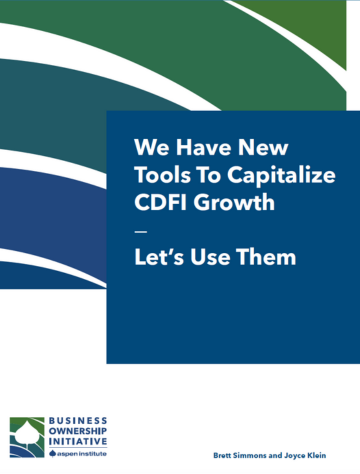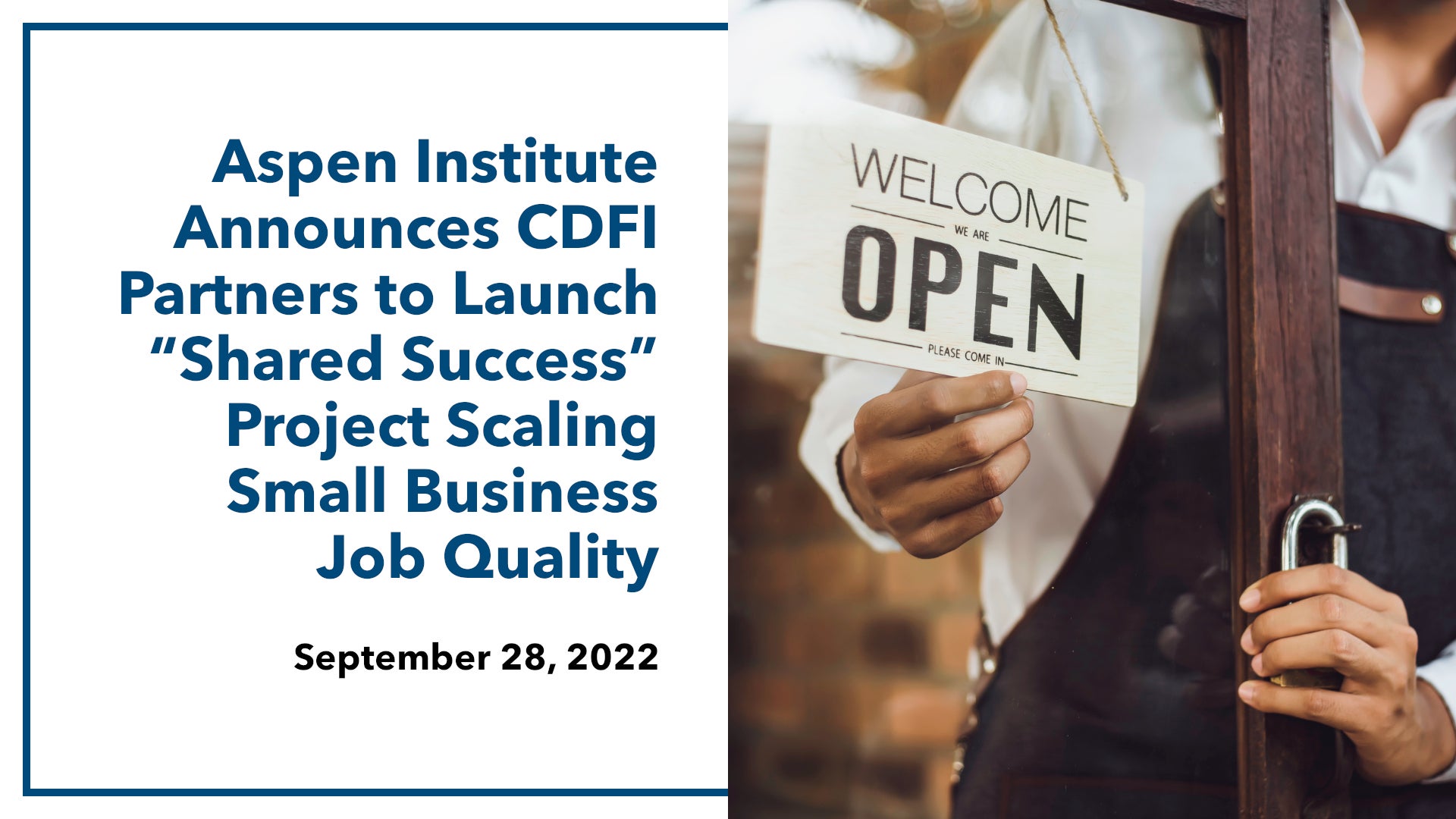Honorable Delegates, thank you for the opportunity to testify on this important issue.
I am the Senior Director of the Business Ownership Initiative at the Aspen Institute and chair of the Responsible Business Lending Coalition. The Aspen Institute is a global nonprofit organization committed to realizing a free, just, and equitable society. Founded in 1949, the Institute drives change through dialogue, leadership, and action to help solve the most important challenges facing the United States and the world.
Our work at the Business Ownership Initiative focuses on getting capital and resources to the people who face the greatest challenges starting and growing businesses. These are people of color, women, rural residents, and others. In this work, we partner closely with Community Development Financial Institutions because we think that they are an essential and proven way to reach those who traditional capital sources won’t reach. But that said, we are in fact agnostic about the kinds of institutions that serve these entrepreneurs. They can be for profit or nonprofit, depositories or nonbank financing companies, they can use a little bit or a lot of technology. What we want is for business owners who have been underserved are reached with products that help them to start, stabilize and grow. What we do not want is for them to get access to products that take too much money out of the business, or that inhibit their ability to grow.
I noted that I am also chair of the Responsible Business Lending Coalition, which is a cross-sector coalition of CDFIs, fintech lenders, small business advocacy and support organizations and investors. The coalition came together in 2014 because of what we saw happening in the small business financing market after the Great Recession. The contraction in credit markets that happened after the recession accelerated an existing trend of declining levels of bank lending to small businesses, particularly for smaller loans below $250,000. Smaller loans are essential in meeting the needs of the markets we care about – such as minority and women-owned firms. Because these businesses have been starved of access to capital and markets the past, their businesses are smaller in terms of revenues. That in turn means that they only have the financial capacity to take on and repay smaller loans. Data from the Federal Reserve’s Small Business Credit Survey confirms that more than half, and in some cases almost 2/3 of minority- and women-owned firms are seeking loans of less than $100,000.[1]
As often happens when there is a gap in the market, innovation, and new players step in. That’s generally good. The irresponsible lending problems that you will hear about today do not result from new types of financing companies stepping. The irresponsible lending problems also aren’t a function of whether the financing firm is using lots of technology, or more basic tech tools. They stem from problems with some of the specific funding practices being used, and inadequate price disclosure that limits whether small businesses can understand, compare, and afford those products. We started the Responsible Business Lending Coalition because through our work with CDFIs and other small business organizations, we heard that too many business owners are getting financing that they don’t fully understand. We found that the repayments were taking way too much cash out of the small businesses, who then struggled to pay their other bills, buy new inventory, or make payroll. Sometimes in trying to keep their businesses afloat, these businesses accepted the encouragement of these high-priced financing companies to borrow even more and dug themselves into a deeper hole.
The stories we were hearing from our partners have been borne out by five studies published by the Federal Reserve. This research has demonstrated that small business owners want information that can help them to compare different financing offers and choose what’s best for them. Small business owners specifically ask for APR.[2]
One of the lessons from work to expand financial inclusion – in the US and globally – is that as we expand access to financial products, we must include appropriate customer protections or inclusion can give way to predation. This predation can strangle both customers and innovation. In my work at the Aspen Institute, we follow what’s happening in financial inclusion and microfinance globally. In fact, I recently wrote a working paper that covers this issue with Tim Ogden from the Financial Access Initiative at NYU’s Wagner Graduate School of Public Service.[3] We wrote about the history of microfinance in the US, which started with initiatives created by Benjamin Franklin, and how efforts to open access to financial services or credit are accompanied by predatory practices. So, as you open access you have to make sure you are also paying attention to borrower or customer protections.
What I think we want is a small business financing market that leads to thriving small businesses. To get there, we need financing firms to compete on price, not just on speed or easy access. But financing companies won’t have to compete on price until everyone is disclosing prices transparently as APRs. That’s what business owners need to make the best choices. And that’s what the market needs to produce innovation instead of predation.
That’s what this bill is about.
Thank you again for the invitation to testify on this important issue.
References
[1] “2022 Report on Firms Owned by People of Color: Based on the 2021 Small Business Credit Survey.” 2022. Small Business Credit Survey. Federal Reserve Banks. https://doi.org/10.55350/sbcs-20220629 p, 11; “2016 Small Business Credit Survey Report on Women-Owned Firms.” 2017. Small Business Credit Survey. Federal Reserve Banks. https://doi.org/10.55350/sbcs-20171130 p. 17.
[2] See 1) Federal Reserve Bank of Cleveland, “Clicking for Credit: Experiences of Online Lender Applicants from the Small Business Credit Survey,” August 2022. https://www.clevelandfed.org/publications/cd-reports/2022/sr20220816-clicking-for-credit-experiences-of-online-lender-applicants-from-sbcs 2) Board of Governors of the Federal Reserve System, “Uncertain Terms: What Small Business Borrowers Find When Browsing Online Lender Websites,” December 2019. https://www.federalreserve.gov/publications/files/whatsmall-business-borrowers-find-when-browsing-online-lender-websites.pdf 3) Board of Governors of the Federal Reserve System, “Searching for Small Business Credit Online,” Consumer and Community Context, Nov 2019, Vol 1, No 2, https://www.federalreserve.gov/publications/files/consumercommunity-context-201911.pdf 4) Federal Reserve Board of Governors, “Browsing to Borrow: ‘Mom & Pop” Small Business Perspectives on Online Lenders,” June 2018. https://www.federalreserve.gov/publications/files/2018-small-business-lending.pdf 5) Federal Reserve Bank of Cleveland, “Alternative Lending through the eyes of ‘Mom & Pop’ Small-Business Owners,” August 2015. https://www.clevelandfed.org/newsroom-and-events/publications/special-reports/sr20150825-alternative-lending-through-the-eyes-of-mom-and-pop-small-business-owners.as
[3] Klein, J. and T. Ogden (2023). “Lessons for Global Microfinance from…the United States”, Working Paper, Financial Access Initiative, NYU-Wagner. https://www.financialaccess.org/publications-index/2024/2/1/lessons-for-global-microfinance-fromthe-united-states

